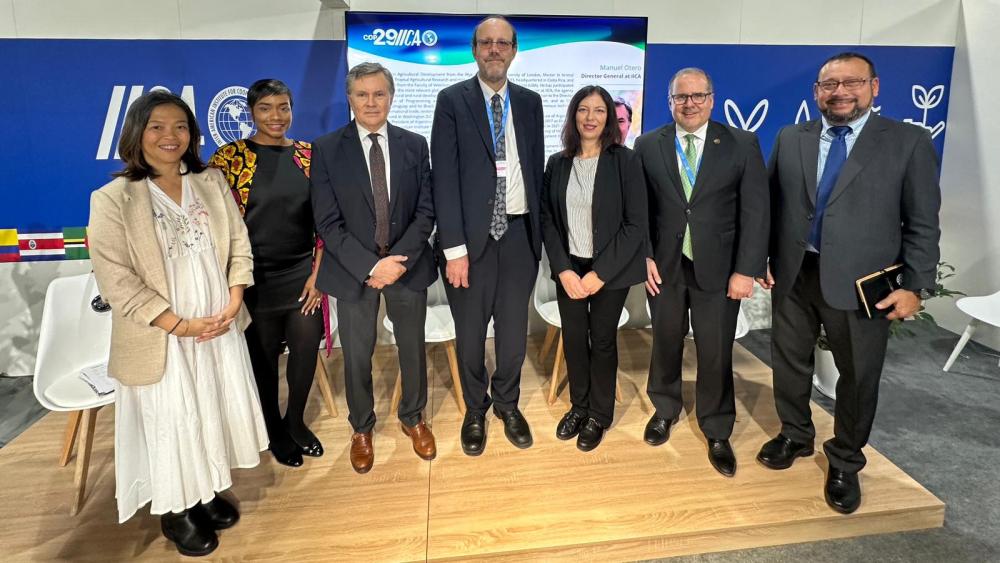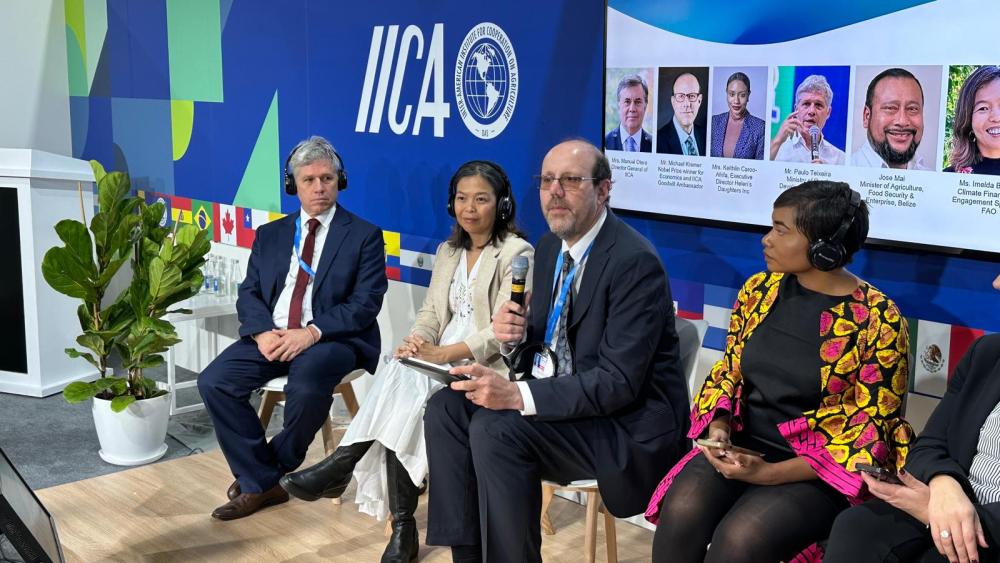Nobel Laureate in Economics Michael Kremer joins farmers' voices at IICA pavilion at COP29 to showcase agricultural innovations driving adaptation and mitigation

Baku, Azerbaijan, 14 November 2024 (IICA) –Productive innovations that are increasing the capacity of the agricultural sector in the Americas to adapt to climate change and contribute to mitigating its causes were showcased to the international community gathered at COP29 in an event at the pavilion of the Inter-American Institute for Cooperation on Agriculture (IICA) and its partners in Baku.
The voices of producers from across the continent, key players in global food security and environmental sustainability, were present in this discussion forum that brought together leading political figures from 197 countries.
Also joining them was 2019 Nobel Laureate in Economics Michael Kremer, who emphasized the importance of innovation in improving farmers’ situations.
The Home of Sustainable Agriculture of the Americas is the name of the pavilion, which was also present at COP27 and COP28, and was made possible through the efforts of private-sector organizations from the continent committed to environmentally sustainable production.
“Dialogue for Climate Action: Farmers' Voices in Combating Climate Change” was the title of the discussion, which featured a presentation by Kremer, who is not only a Nobel Laureate but also IICA’s Goodwill Ambassador for Sustainable Development. The Minister of Agrarian Development and Family Farming of Brazil, Paulo Teixeira, also participated in the conversation.
Additional participants included Keithlin Caroo-Afrifa, Executive Director of the Helen’s Daughters organization, which supports rural women in the Caribbean; Luisa Volpe from the World Farmers’ Organisation (WFO); and Imelda Bacudo, a climate finance expert from FAO.
IICA Director General Manuel Otero gave the opening remarks, and Lloyd Day, IICA’s Deputy Director General, served as the conversation moderator.
The Potential of Innovation
Kremer stated that he is proud to have been connected to IICA for several years and stressed that the potential of innovation to improve the situation of small farmers is immense.
“In my work, I’ve reviewed extensive evidence showing how very basic, simple technological tools have increased farmers’ productivity and transformed the lives of people in rural communities worldwide,” he said.
Kremer pointed out that, at a very low cost, digitalization can help small producers access information, share knowledge, and improve their market access.
“For instance, in Ecuador, text messaging helped potato farmers manage pests and diseases far more efficiently. In Colombia, smartphones have been used to deliver highly accurate weather information, leading to changes in farming practices,” he added.
Brazilian Minister Teixeira noted that agriculture is a crucial part of the solution to climate change and anticipated that COP30, to be held next year in Belém do Pará, Brazil, will be an excellent occasion to reaffirm this.
“In Brazil, we have made strides in harmonizing production and conservation, with a key tool being financing that incentivizes small farmers. We have EMBRAPA (the Brazilian Agricultural Research Corporation) and specially tailored financing for farmers who produce sustainably and protect forests. This has led to a 53% reduction in deforestation in Brazil from last year to this year,” he affirmed.
Otero explained that IICA came to COP29 with three fundamental premises to share. One is that farmers must play a central role in discussions about the future of production methods; another is that science and innovation should underpin decision-making; and finally, that agriculture must be seen as part of the solution to climate challenges.
“We must not forget that agriculture is an instrument of peace in times of upheaval and conflict across much of the world,” he concluded.
Lloyd Day spoke about the importance of presenting the realities of agriculture—often criticized for allegedly being responsible for climate change—at the world’s foremost environmental negotiation forum and stressed the urgent need for funding to accelerate transformations.

Part of the discussion
Luisa Volpe explained that the World Farmers’ Organisation (WFO) comprises 81 federations from 55 countries worldwide.
“We bring farmers' voices into negotiations, and IICA is an indispensable partner for us as it represents producers in the Americas. Farmers are entrepreneurs and part of the private sector. We are here to assist governments and must be involved in the drafting of Nationally Determined Contributions (NDCs), which each country submits under the Paris framework,” Volpe stated.
Imelda Bacudo, from FAO, also emphasized the central role of agriculture in addressing global challenges, particularly for climate change mitigation.
“We cannot rely solely on forests as carbon sinks to meet the commitments of the Paris Agreement. Farmers are essential and must be included in the NDCs.”
Caroo pointed out that those who cultivate the land in the Caribbean are not only producers but also community leaders who participate in decision-making. Caroo, a rural woman and Goodwill Ambassador of IICA, leads an organization that works in Saint Lucia, Saint Kitts and Nevis, and Saint Vincent and the Grenadines.
“We work to ensure farmers adapt to climate conditions by using seed varieties and indigenous methods to reduce soil erosion. We promote the integration of technologies for small islands that are vulnerable. Ninety percent of our support comes from outside the Caribbean, so financing is our biggest hurdle,” she acknowledged.
More information:
Institutional Communication Division.
comunicacion.institucional@iica.in